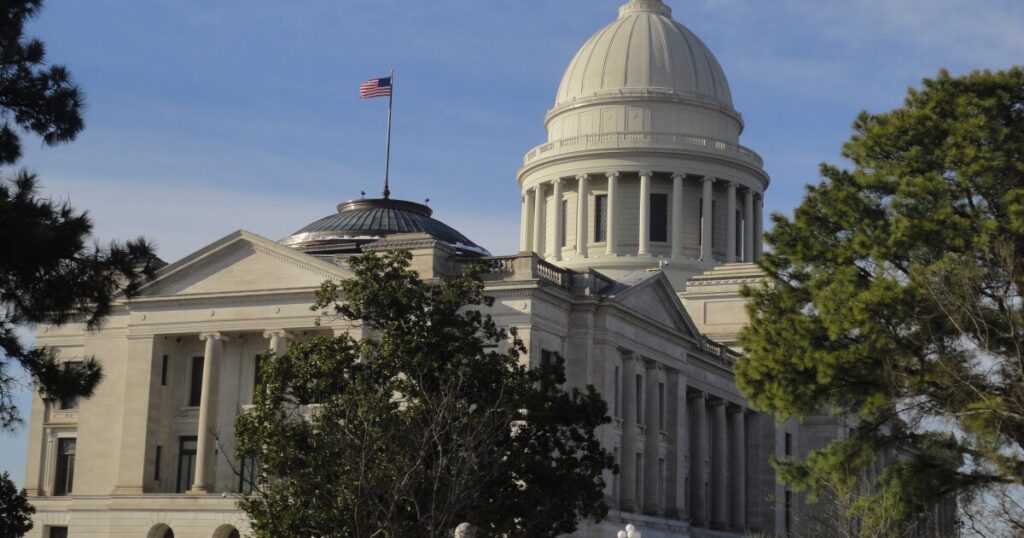The fiscal session of the Arkansas Legislature begins Wednesday, with Gov. Sarah Huckabee Sanders asking lawmakers to modestly increase the state's budget.
Little Rock Public Radio asked the governor if the 1.78% increase over last year would cover all the funding he wants. This includes increasing the minimum salary for teachers to $50,000, as well as $2 million for the University of Arkansas at Pine Bluff and just under $4 million for the new state trooper academy.
Sanders said that's enough.
“We must stop government growth while allowing investment in this administration’s key priorities,” she said.
Arkansas' budget grows by an average of 3% each year. Experts say this means most state agencies can expect minimal funding and not much room for salary increases. But perhaps the country won't be in debt and will have a surplus by the end of the fiscal year.
Sanders asked for an increase in a letter to lawmakers. Rep. Aaron Pilkington, R-Knoxville, said it was “shocking” to see how little the budget was.
“My first impression was, 'Wow, that's a small increase,'” he said.
But Pilkington says he started warming up to the idea after committee meetings in recent weeks.
“There was a preliminary budget hearing and we just came in and explained what they were doing and what was going on,” he says. “In my mind, I started thinking, 'This makes sense.' We can do it.”
Sanders' goal of eliminating state income taxes is one reason for the smaller-than-average funding increase. The Legislature approved new tax cuts last session, but the governor says they're just the beginning.
“If you want to do things like phase out state income taxes, you have to slow down government growth,” she says.
While further tax cuts may not be on the table this Congress, many Republicans agree they will eventually cut taxes. Pilkington doesn't know if there will be further cuts now, but he thinks the state is preparing for a good future.
“By not increasing future spending, we can cut taxes without cutting services.”
Pilkington said he wants Arkansas to compete with neighboring states like Texas and Tennessee, which have no income tax.
This conflict between tax cuts and money for services raises the age-old question of how big government should be. Arkansas Democrats generally want to increase state funding for services, but they have no real influence.
One of the few Democrats in the state is Sen. Clark Tucker, who represents part of central Arkansas. In a perfect world, he would provide more funding for public services.
“We will invest more in K-12 education to ensure more people have the opportunity to attend college or obtain post-secondary training licensure,” he said. Stated.
Tucker said the state invests too much into the justice system and also wants to expand mental health services and substance abuse treatment.
However, so far this has not become a reality. Most of the legislators in Arkansas are small-government conservatives in a deeply red state.
Tucker did not name names, but said state officials are concerned that the budget for the next few years will be too small.
“State agency heads will tell you they're losing employees because they can't keep up with payroll,” he says. “We can't fill the parole officer positions that we desperately need as a state. We can't fill the prison officer positions that we desperately need because the numbers are flat.”
This is an argument that even Mr. Pilkington, a Republican, understands.
“When you think about a lot of these agencies' budgets, 60% to 80% are staffing, so this is obviously a problem. Even if we don't increase it as much as we have in the past, the grip will be even tighter.”
One of the programs the budget funds is Arkansas LEARNS. This is a law that gives families public funds to send their children to private schools. Senator Tucker was a vocal opponent of LEARNS when it was in Congress. But departmental budgets are voted on as a package. LEARNS funding is not collected separately from the remaining funding to the Department of Education.
“I had an opportunity to speak out against LEARNS. I lost that battle,” said Tucker. “And really, all I need is to fund our education system.”
Mr Pilkington said he would also vote yes on most budget proposals.
“A union member came up to me and said, 'DMV is behind on issuing driver's licenses on time, and I want you to help us stay on this budget.'” I said, “Well, yeah. , it sounds like it's your DMV problem, not a statewide problem.'' [Department of Finance and Administration]The budget you're willing to put up with for one problem. ”
The fiscal session begins Wednesday morning at noon.


